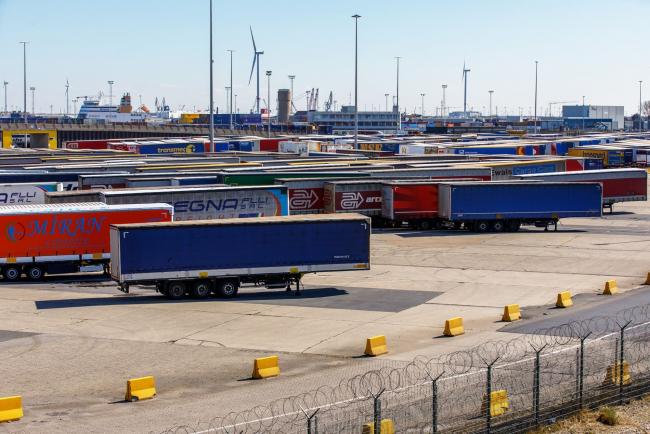(Bloomberg) -- The U.S. is weighing new tariffs on $3.1 billion of exports from France, Germany, Spain and the U.K., adding to an arsenal the Trump administration is threatening to use against Europe that could spiral into a wider transatlantic trade fight later this summer.
The U.S. Trade Representative wants to impose new tariffs on European exports like olives, beer, gin and trucks, while increasing duties on products including aircrafts, cheese and yogurt, according to a notice published late Tuesday evening. The statement lays out a month-long public comment period ending July 26.
The Euro Stoxx 50 index, which tracks leading companies in the euro area, extended a decline on the news, slumping 2% at 11:26 a.m. in Brussels. The U.K.’s FTSE 100 hit intraday lows.
If the U.S. follows through with its plan, it could hammer European luxury brands like Givenchy and Hermes -- which produce leather goods -- and Remy Cointreau and Pernod Ricard (PA:PERP), which make cognac and champagne. LVMH Moet Hennessy Louis Vuitton would be particularly vulnerable because it produces a wide array of these products.
Tariffs on British gin could increase U.S. prices at peak season for gin-and-tonics, potentially hurting British spirits companies like Diageo (LON:DGE) Plc, the London-based maker of Tanqueray; James Burrough, the maker of Beefeater gin; and William Grant & Sons, the maker of Hendricks gin.
German Beer
New U.S. duties might also dampen demand for German beer ahead of any Oktoberfest celebrations that aren’t already canceled because of the coronavirus.
The addtional import taxes would already add to the 25% tariff the U.S. imposed last year on imports of Scotch and Irish Whisky and liqueurs and cordials from Germany, Ireland, Italy, Spain, and U.K.
The Distilled Spirits Council in the U.S. said it opposed any additional spirits tariffs, which would “escalate trade tensions across the Atlantic and further jeopardize American companies and hospitality jobs already under duress as a result of COVID-19,” according to a statement.
The move is related to Europe and America’s 15-year-old World Trade Organization aircraft subsidy fight. A couple of years ago the Geneva-based trade arbiter said both the U.S. and the EU were guilty of illegally supporting their respective aircraft industries.
In October the U.S. gained the upper hand when the WTO authorized President Donald Trump to retaliate against $7.5 billion worth of EU exports in response to Europe’s illegal subsidies to Airbus SE (OTC:EADSY). Next month the WTO is expected to deliver a retaliation award to the EU in its separate but related case against U.S. subsidies to the Boeing (NYSE:BA) Co.
Carousel of Pain
In the meantime, Trump’s top trade official, Robert Lighthizer, has sought to increase pressure on the Europeans by deploying a particularly damaging tactic called “carousel retaliation,” whereby a country periodically shifts tariffs on different groups of goods.
Tuesday’s USTR notice is a reminder that the U.S.’s tariff targets may shift or be subject to higher levies -- a strategy that spreads the sanctions pain across an array of industries, creating uncertainty for businesses and headaches for exporters and importers alike.
Earlier this year the U.S. deployed its carousel retaliation strategy to increase tariffs on exports of Airbus aircraft and parts from 10% to 15%. To date the U.S. has only deployed tariffs on goods worth about half of its permitted retaliation levels.
Lighthizer said his goal in increasing tariffs is to persuade the EU to agree to a settlement. But talks between the U.S. and the EU have floundered this year, and now the EU is preparing to retaliate with new tariffs against an array of politically sensitive U.S. industries.
Stalled Talks
“The U.S. has stepped back from the settlement talks in recent weeks,” EU Trade Commissioner Phil Hogan told European trade ministers on June 9. “If this remains the case, the EU will have little choice but to exercise its retaliation rights and impose our own sanctions.”
The EU has asked the WTO to give it the green light to place levies on as much as $11.2 billion worth of U.S. exports to Europe in retaliation for America’s illegal subsidies to Boeing. The Trump administration argues the WTO award will be much smaller, with only about $300 million at stake.
Regardless of the level of the WTO award, the U.S. is now preparing to hit more European products as a means to dissuade the EU from retaliating at all.
“There is no valid basis for the EU to retaliate against any U.S. goods,” Lighthizer said last month. “We will continue to press the EU to negotiate a resolution that respects the WTO’s findings.”
(Updates with gin makers in fourth paragraph)
©2020 Bloomberg L.P.

